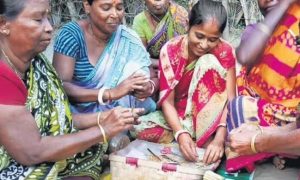Bidi makers in Kendrapara left high and dry

Kendrapara: As many as 10,000 unorganised workers, mostly women and children, roll bidis in this district to make ends meet, even as their struggles remain largely unnoticed. Among the 10,000 individuals in the district engaged in bidi-making, at least 8,000 are women and children who have taken up the work out of financial necessity.
However, prolonged exposure to the chemicals used in bidi production has led to widespread health issues such as chronic cough, tuberculosis (TB), fever, and respiratory problems among them. Yet, most of these workers lack access to adequate healthcare facilities. Due to the unorganised nature of their work, these labourers remain outside the reach of government welfare schemes. There is a growing demand in the area for a dedicated health care facility for bidi workers. Trade Union leader Jaga jiban Das noted that the district’s economy does not have any major revenue-generating sources, and nearly 51 per cent of families have male members who have migrated outside the district for employment.
As a result, the burden of supporting families often falls on the women and children left behind, who turn to bidi-making as a livelihood. “More than 8,000 women and children are involved in this hazardous trade,” Das said. “As they are not part of any organised labour group, they are excluded from government schemes meant for workers’ welfare.” Srimati Patra of Dalhia village under Mahakalapara block said her family lives in poverty. In the absence of local industries or stable employment, her husband is forced to work at a spinning mill in Surat of Gujarat. Meanwhile, she and her children roll bidis after sourcing raw materials from local middlemen. “We earn only Rs 100 even after rolling 1,000 bidis a day,” Patra said, adding that she has also involved her daughter in this work to increase their earnings. Sajeda Khatun of Dobandha village in Kendrapara block, who has been engaged in this work for nearly 10 years, said they will not get anything to eat if they don’t roll bidis.
However, the bidi rollers’ family members have been suffering from various ailments, including TB and respiratory problems. They have to travel nearly 20 km to the district headquarters hospital to get treatment. Proper medical care eludes the bidi workers and their family members owing to the absence of a dedicated health care facility. Low earnings coupled with high medical expenses have disrupted the families’ financial and social stability. Another labour leader, Gayadhar Dhal, noted that bidi workers largely remain unorganised, and their hardships often go unnoticed by both administrative officials and political leaders. He demanded a separate health care facility for bidi workers and an increase in their wages. When contacted, Additional District Magistrate Rabindra Mallik said that both the state government and the Centre have launched specific schemes to safeguard the interests of labourers. These schemes include financial assistance for health care, housing, and even education and marriage expenses for the workers’ wards. He urged workers in this category to register their names with the district labour office to benefit from such schemes.
News